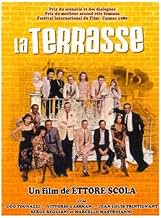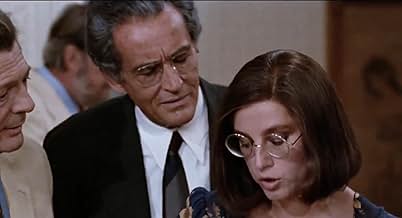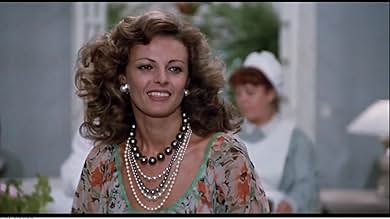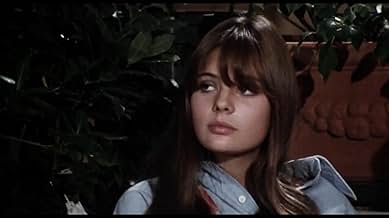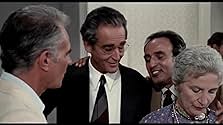IMDb-BEWERTUNG
7,1/10
2008
IHRE BEWERTUNG
Füge eine Handlung in deiner Sprache hinzuDuring a dinner in a Roman terrace, the lives and experiences of multiple characters intertwine.During a dinner in a Roman terrace, the lives and experiences of multiple characters intertwine.During a dinner in a Roman terrace, the lives and experiences of multiple characters intertwine.
- Regie
- Drehbuch
- Hauptbesetzung
- Auszeichnungen
- 5 Gewinne & 1 Nominierung insgesamt
Jean-Louis Trintignant
- Enrico D'Orsi
- (as Jean Louis Trintignant)
Agenore Incrocci
- Vittorio
- (as Age)
Leonardo Benvenuti
- Un ospite
- (as Leo Benvenuti)
Empfohlene Bewertungen
The movie's status as a cult classic definitely makes sense to me now. It's a very satirical and thorough look at the italian elite of intellectuals and artists, all of them very narcissistic, pretentious, self-pitying, emotionally unstable, in a constant internal state of decay, brandishing political theory without actually applying it, fighting unsuccessfully against the world of the 80s and capitalism and profit. All the main characters are tragic, and their awareness of their own pathetic nature makes them even more unhappy. They're all men who use women or demand their attention and their love, they try to find happiness where it doesn't belong. The theme of the movie is the humorous existential loneliness of the self-aware bourgeoisie. I have some complaints, like the fact that the movie is a bit long for my taste, and some of the 5 episodes really drag. The actors are almost all pretty good, the final raging monologue of Mario is amazing. The humor holds up pretty well, and it's always interesting to see how an older generation of creatives saw themselves. Overall, not very digestible, but fine as an intellectual and thought provoking portrait of the 80s artlife.
We follow five friends at the same party. A writer, a producer, a director, a politician and a journalist. There they meet new and old flames and quarrel a bit. All are experiencing an intellectual and emotional crisis.
I loved the many subtle symbols in this film. For instance, the young girlfriends; Sergio who is not eating; the crisis of being a leftist ('I'm much more left-wing than you!'); the success of women.
Even better is Scola's mockery with intellectualism. As you sometimes hear at parties people say: 'Mannerism is out of fashion', and you haven't got an clue what the purpose is of this comment. Every character here thinks himself as being witty, except the producer, and it is precisely him who produces a dramatic masterpiece that is praised by the intellectual elite.
Scola portrays disappointments beautifully - it is seen between the lines, as it was as well in Brutti, sporchi e cattivi. So, I highly appreciated this film, but you have to bear in mind it is a film of almost three hours. A perfect film for a rainy Sunday.
I loved the many subtle symbols in this film. For instance, the young girlfriends; Sergio who is not eating; the crisis of being a leftist ('I'm much more left-wing than you!'); the success of women.
Even better is Scola's mockery with intellectualism. As you sometimes hear at parties people say: 'Mannerism is out of fashion', and you haven't got an clue what the purpose is of this comment. Every character here thinks himself as being witty, except the producer, and it is precisely him who produces a dramatic masterpiece that is praised by the intellectual elite.
Scola portrays disappointments beautifully - it is seen between the lines, as it was as well in Brutti, sporchi e cattivi. So, I highly appreciated this film, but you have to bear in mind it is a film of almost three hours. A perfect film for a rainy Sunday.
"During the dinner sequences, it is like operating an ensemble piece on a dime, DP. De Santis adroitly interposes long takes among various characters, discreetly listens to their conversations, or follows the kerfuffles, but there are no Altmanesque flourishes, which can concatenate all the fluid movements into a delectable visual orchestra. Here, Scala is more keen on building the signs of the times than showing off his sleight of hand, and juggling between studio and location shooting, LA TERRAZZA is an oddity that looks old school but attempts to say something au courant (the self-reflection of a society burdened with bureaucracy, commercialism and hypocrisy), therefore, it feels often luxuriate in the inner circles' own woes and melancholia. It is so cruel to see Mastroianni's Luigi the journalist, gets a cold shoulder from a young girl, the erstwhile Italian dreamboat now has been reduced to a gabby uncle figure that is so detached from the younger generation (a metaphor of Italian cinema's glorious days are on the ineluctable wane)."
keep reading my review on my blog: cinema omnivore, thanks
keep reading my review on my blog: cinema omnivore, thanks
Commedia all'Italiana had pretty well run its course by the time Ettore Scola made this film but its dark humour, scathing social satire and colourful characters certainly qualify it as typical of that particular genre. One is hardly surprised as the award-winning script is by the redoubtable duo of Age and Scarpelli whilst the cast is headed by three of the greatest male practitioners of Italian comedy, namely Marcello Mastroianni, Vittorio Gassman and Ugo Tognazzi. The absent Alberto Sordi gets a mention! As a bonus there are beautifully observed portraits of a deranged writer by Jean Louis Trintignant and a depressed pen-pusher by Serge Reggiani. On the distaff side Stefania Sandrelli proves once again that she is more than just a pretty face by picking up a Nastro d'Argento for her performance as Gassman's lover and as Mastroianni's ex-wife the elegant Carla Gravina was recognised at Cannes.
Although not Scola's greatest this is still the work of a master film-maker, is eminently watchable and fully justifies its length. The inexorable passing of time with its painful regrets, the fragility of relationships and the frailties of humankind as depicted here cannot fail to strike a chord and we are furthermore treated to a level of artistry from the principals that belongs to a vanished era.
Although not Scola's greatest this is still the work of a master film-maker, is eminently watchable and fully justifies its length. The inexorable passing of time with its painful regrets, the fragility of relationships and the frailties of humankind as depicted here cannot fail to strike a chord and we are furthermore treated to a level of artistry from the principals that belongs to a vanished era.
Ettore Scola has made at least two great films, C'eravamo tanto amati and Une giornata particolare. But this time he got carried away. It's not enough to put 20 great actors in a room to end up with a masterpiece. Call it self- indulgent, call it intellectual masturbation, I call it boring. Sorry, Ettore.
Wusstest du schon
- WissenswertesSerge Reggiani's character in the movie Is producing a TV adaptation of Théopile Gautier's famous novel "The Captain Fracasse";10 years later, director Ettore Scola will make a movie adaptation of the same novel, titled "CAPTAIN FRACASSA'S JOURNEY"
- Zitate
[repeated line]
Hostess at 15° PCI's Congress: Dinner is served. Come!
- VerbindungenFeatured in La strana coppia. Incontro con Age e Scarpelli (2001)
- SoundtracksConcerto N.8 in La Minore
by Antonio Vivaldi
Top-Auswahl
Melde dich zum Bewerten an und greife auf die Watchlist für personalisierte Empfehlungen zu.
- How long is La terrazza?Powered by Alexa
Details
- Erscheinungsdatum
- Herkunftsländer
- Sprache
- Auch bekannt als
- Terrassen
- Drehorte
- Foro Piscario, Via della Tribuna di Campitelli, Rom, Latium, Italien(Mario and Giovanna in the ruins of a Roman monument)
- Produktionsfirmen
- Weitere beteiligte Unternehmen bei IMDbPro anzeigen
- Laufzeit2 Stunden 30 Minuten
- Sound-Mix
- Seitenverhältnis
- 1.85 : 1
Zu dieser Seite beitragen
Bearbeitung vorschlagen oder fehlenden Inhalt hinzufügen


